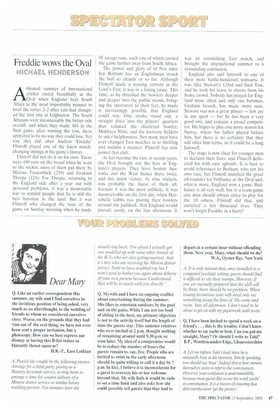Freddie wows the Oval
MICHAEL HENDERSON
Abloated summer of international cricket ended beautifully at the Oval when England beat South Africa in the most improbable manner to level the series 2-2 after rain had disrupted the first one at Edgbaston. The South Africans were incontestably the better side overall, and when they made 484 in the final game, after winning the toss, there appeared to be no way they could lose. Yet lose they did. after Andrew 'Freddie' Flintoff played one of the finest matchchanging innings in the game's history.
Flintoff did not do it on his own. There were 480 runs on the board when he went to the wicket, most of them put there by Marcus Trescothick (219) and Graham Thorpe (124). For Thorpe, returning to the England side after a year out with personal problems, it was a memorable way to remind people that he is still the best batsman in the land. But it was Flintoff who changed the tone of the game on Sunday morning when he made 95 savage runs, each one of which carried the game further away from South Africa.
The power and glory' of it! Not since Ian Botham has an Englishman struck the ball so cleanly or so far. Although Flintoff made a rousing century in the Lord's Test, it was in a losing cause. This time, as he thrashed the bowlers deeper and deeper into the public stands, bringing the spectators to their feet, he made it increasingly possible that England could win. One stroke stood out, a straight drive into the players' quarters that reduced the shattered bowler, Makhaya Ntini, and the footsore fielders to utter helplessness. Not many men have ever changed Test matches in so thrilling and sudden a manner. Flintoff has now joined that club.
As has become the case in recent years, the Oval brought out the best in England's players. They have beaten Australia and the West Indies there twice, and this latest victory, by nine wickets, was probably the finest of them all, because it was the most unlikely. It was inconceivable on the first day, when Herschelle Gibbs was pasting their bowlers around the paddock, that England would prevail, easily, on the last afternoon. It was an astonishing Test match, and brought the international summer to a resounding conclusion.
England also said farewell to one of their most battle-hardened stalwarts. It was Alec Stewart's 133rd and final Test, and he took his leave to cheers from his home crowd. Nobody has played for England more often and only one batsman, Graham Gooch, has made more runs. Stewart was not a great player — few are in any sport — but he has been a very good one, and remains a proud competitor. He hopes to play one more season for Surrey, where his father played before him, but there is no certainty that they will offer him terms, so it could be a long farewell.
The stage is now clear for younger men to declaim their lines, and Flintoff delivered his with rare aplomb. It is best to avoid references to Botham, who ran his own race, but Flintoff matched the great all-rounder for brilliance at the Oval and, what is more, England won a game. Brilliance is all very well, but in a team game one man should always strive to play for the 10 others. Flintoff did that, and enriched a few thousand lives. They won't forget Freddie in a hurry!


























































































 Previous page
Previous page